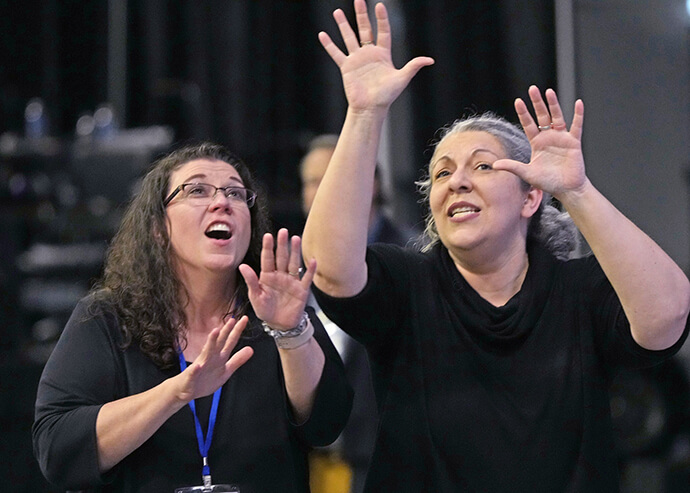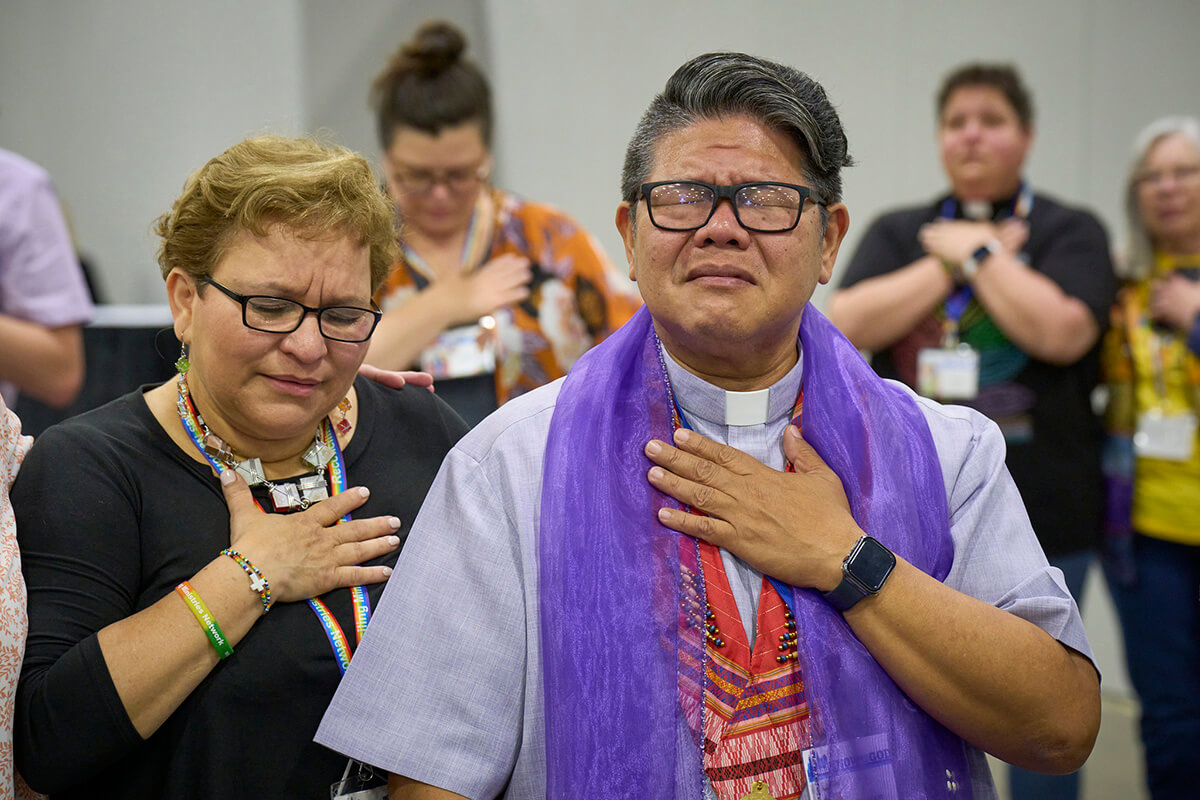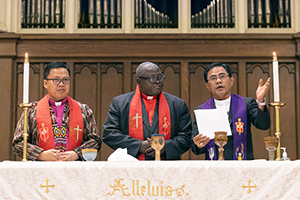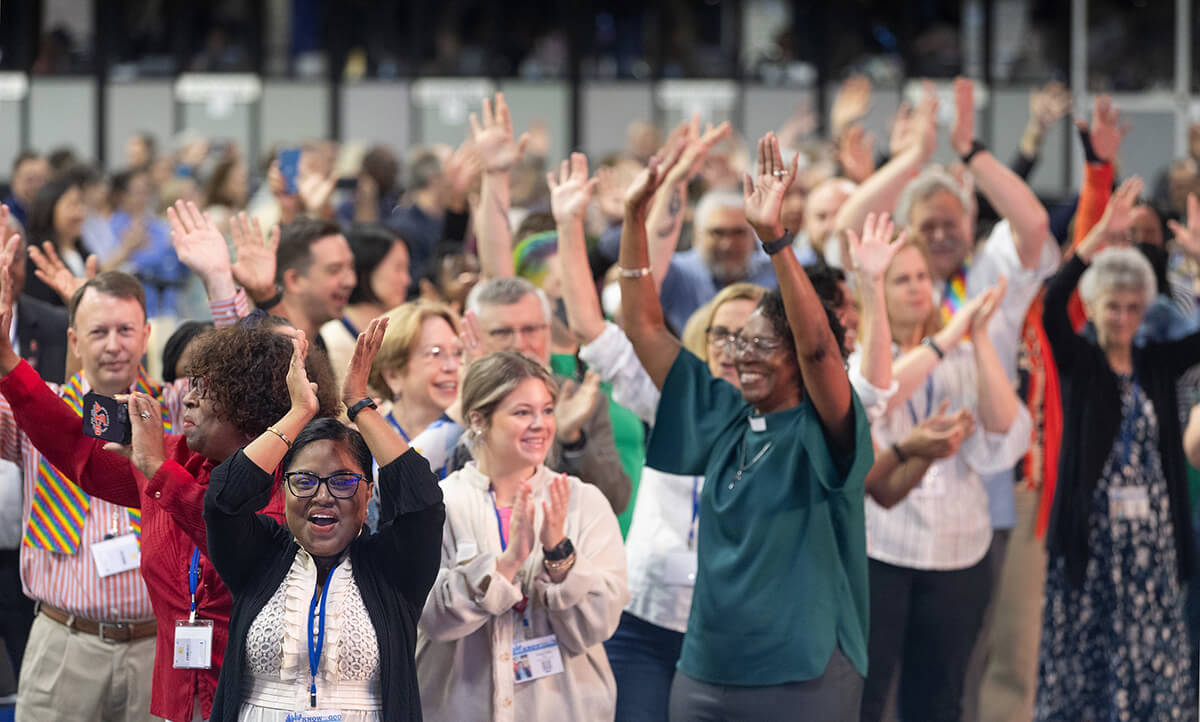On the final day of a General Conference eight years in the making — the Rev. Gary Graves, General Conference secretary, referred to it as “the multipurpose 2020 and 2024” meeting — delegates set the budget that will fund the ministries of the denomination for the next four years, a budget significantly lower than the one it set in 2016.
It could be argued that this was the most consequential General Conference since the 1968 assembly that created The United Methodist Church. The church going forward from here is different than it was just a few weeks ago. Not all agree with the more inclusive stance the delegates took, but the passage of worldwide regionalization ensures all may continue ministry in their own context while remaining part of the connection.
Church leaders are already looking at how members can remain united despite having different views, and delegates created a path for churches that have left the denomination to return in the future.
The votes that changed the church’s stance on sexuality may have garnered the most attention, but they were not the only actions taken in Charlotte.

During the 10 days, delegates considered more than 1,000 petitions. Among other actions, they approved a new retirement plan for clergy, granted deacons authority to offer Holy Communion and conduct baptisms in their ministry setting, celebrated church milestones, agreed to a full communion relationship with the Episcopal Church, and approved the departure of four Eurasian annual conferences that plan to become the autonomous Christian Methodist Church.
The final action was a 324-338 vote against reconsidering an earlier petition that would have added fossil fuels to the list of companies in which Wespath is prohibited from investing.
Drawing the assembly to a close with a centering moment after presiding over the final plenary session, Bishop Tracy S. Malone told everyone gathered:
“As you go forward from this General Conference, tell the world about Jesus. As you go, tell them about his love. As you go, be love. … Let’s walk together, beloved, and let us never grow weary of doing the work of the kin-dom.”

GC delegates pass budget, reduce number of US bishops
Delegates on May 3 approved a denominational budget with a bottom line that will vary by about $20 million, depending on giving collection rates over the next two years.
By a vote of 647 to 31 (a 95% majority), this year’s delegates approved a 2025-28 denominational budget of $373.4 million. That total is contingent on collection rates being at 90% or more for the next two years. If giving is below that percentage, the budget bottom line will be $353.6 million.
Reflecting the effect of the loss of a quarter of U.S. churches to disaffiliation, the budget will be between 38% and 41% lower than the one set by the 2016 General Conference.
Delegates also approved a plan for distributing 32 bishops across the U.S. — which represents a reduction from the 39 active bishops currently serving.
United Methodists remove same-sex wedding ban
United Methodist pastors no longer face potential penalties for being in a same-sex relationship or officiating at same-sex weddings, nor can they be compelled to officiate one.
During the afternoon session of General Conference’s final day, delegates approved four changes to church law that together end remaining bans related to homosexuality and protect the rights of pastors to choose which weddings to perform or not to perform.
They also approved a change to the requirements that clergy practice “celibacy” in singleness — an addition made in 1984 that targeted gay candidates for ministry.
Instead, the delegates supported adding after the requirement of integrity in all personal relationships, “social responsibility and faithful sexual intimacy expressed through fidelity, monogamy, commitment, mutual affection and respect, careful and honest communication, mutual consent, and growth in grace and in the knowledge and love of God.”
Panelists look beyond General Conference
The decisions made at this General Conference are a “testimony” to The United Methodist Church, said Bishop Tracy S. Malone, president of the Council of Bishops.
“We are a church where everyone can belong,” she said.
Malone was part of a panel discussing the future of a church where not every member approves of its new inclusive stance.
Removing condemning language on homosexuality opens the church to be in a worldwide conversation, said Greater Northwest Area Bishop Cedric D. Bridgeforth, adding that he hopes that local churches “will not grow weary in well-doing” because these decisions made at General Conference will call for a cultural shift and hard conversations.

‘Get out of God’s way,’ bishop urges
During the final morning worship at General Conference, Council of Bishops President Tracy S. Malone said the work done at General Conference the past 10 days is not as important as what the church will do next.
The resident bishop of the East Ohio Conference grounded her sermon in the words of Psalm 46:1-3, 10-11 (NRSV). She echoed David’s bold proclamation that God is our refuge and our strength.
She asked delegates to imagine a United Methodist Church where hope is reborn, and where people are reconciled to one another and committed to build God’s beloved community.
“Let us imagine a church where no one, nobody, is marginalized,” Malone said. “Let us imagine a church that transcends geography and cultures and languages and borders and barriers and differences. I’m talking about a beautiful mosaic that reflects the kin-dom, the kingdom of God.”
Church apologizes for sexual misconduct
General Conference issued a heartfelt apology to all who experienced sexual misconduct in The United Methodist Church.
Submitted by the United Methodist Commission on the Status and Role of Women, the apology was part of a resolution passed in the last hour of General Conference on May 3.
Not only was the apology statement read in its entirety during General Conference, but all United Methodist bishops around the world are to read the apology at their own upcoming annual conferences.

General Conference photos
Delegates keep church court busy at assembly’s end
The Judicial Council released five decisions and a memorandum on May 3 in response to a flurry of requests for declaratory decisions — basically rulings on questions about the meaning, application and effect of church law.
New Judicial Council members welcomed
In the May 3 afternoon session, outgoing Judicial Council members were recognized, and the incoming members were welcomed.
The lay and clergy members of the Judicial Council for the 2024-28 quadrennium are:
- Harriett Jane Olson, Greater New Jersey Conference;
- Molly Hlekani Mwayera, Zimbabwe East Conference;
- Bill Waddell, Arkansas Conference;
- Andrew Vorbrich, Michigan Conference;
- The Rev. Øyvind Helliesen, Norway Conference;
- The Rev. Angela Brown, California-Nevada Conference;
- The Rev. Susan Henry-Crowe, South Carolina Conference;
- The Rev. Jonathan Ulanday, East Mindanao Philippines Conference; and
- The Rev. Luan-Vu Tran, California-Pacific Conference.
Henry-Crowe was elected president; Helliesen, vice president; and Brown, secretary.
Votes of note
- General Conference on April 30 approved via consent calendar a resolution asking that United Methodist institutions not buy government bonds from Israel, Turkey and Morocco, given that those nations have engaged in long-term military occupations. The resolution comes amid pro-Palestinian protests on U.S. college campuses and after a demonstration at General Conference, decrying Israel’s military operations in Gaza. Wespath, the church’s pensions and investment agency, said it will carefully consider the non-binding measure.
- “Sent in Love,” brought forward as the official denominational statement about nature of the church (ecclesiology), was referred back to the Commission on Faith and Order for additional revision to reflect current realities of the church as it undergoes regionalization and to be presented in a more accessible manner.
- The majority of legislation supported by climate justice activists within The United Methodist Church was passed by General Conference on the consent calendar in the early part of its second week. Some of the petitions passed would direct churches to conduct annual audits of the carbon footprint of their buildings, grounds or facilities, encourage annual conference sessions to reduce energy waste and consumption, and update or readopt existing church resolutions on creation care.
Subscribe to our
e-newsletter
In other news
- Tears flowed May 2 at the Liturgy of Queer Lament and Celebration held at Charlotte First United Methodist Church. However, a good many of those tears were of the happy variety because of votes on consecutive days that eliminated language prohibiting the ordination of “self-avowed practicing” homosexuals, redefined the church’s view of marriage as between “two people of faith” and ended the church’s 52-year stance that deemed the practice of homosexuality to be “incompatible with Christian teaching.” “Today, those evil words (in the Social Principles) have been banished,” said retired Bishop Hope Morgan Ward.
- During the hurly-burly of General Conference, delegates paused to mark an important United Methodist 100th birthday: that of The United Methodist Building in Washington. The building, near the offices of the Supreme Court and the U.S. Capitol, was completed in 1923, so it has been there for 101 years. But with General Conference delayed nearly a decade by COVID-19, this year was the first chance to recognize it in that forum.
- Ashley Boggan D., top executive of the United Methodist Commission on Archives and History, announced at General Conference May 2 that David Worthington, former global ambassador at John Wesley’s New Room in Bristol, England, has been hired as global ambassador of Methodist heritage sites. “The United Methodist Church’s history is teeming with brick-and-mortar buildings that, if they could talk, would tell the rich stories of our denomination,” Boggan said. “At (Archives and History), our role is to promote and preserve those stories.”
- Wheeled into the auditorium for the General Conference opening worship service, Sara Martin carried the Council of Bishops banner. The message was clear: The United Methodist Church’s global gathering is open and accessible to all. In previous years, people with mobility issues often were restricted by the massive size of convention centers and the long walks from one area to another. This year, assisted by crutches, wheelchairs, walkers, rollators and motorized scooters, dozens of attendees traversed the Charlotte Convention Center.
Butler is a multimedia producer/editor for UM News. Contact him at newsdesk@umcom.org or 615-742-5470. UM News staff, Rick Wolcott, executive director of communications for the East Ohio Conference, and South Carolina United Methodist Advocate editor Jessica Brodie contributed to this report.
To read more United Methodist news, subscribe to the free daily or weekly Digests.



